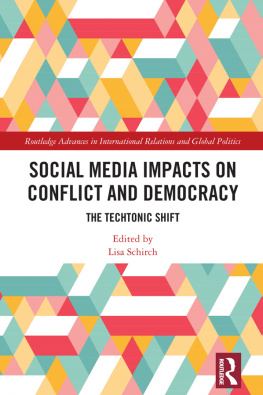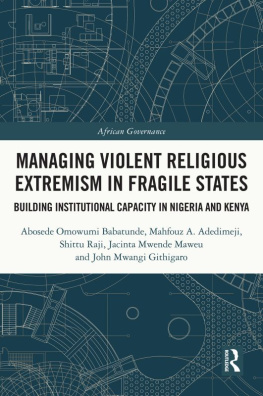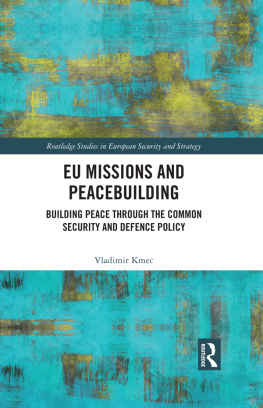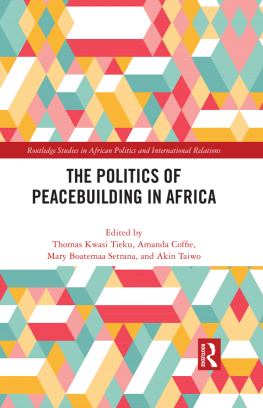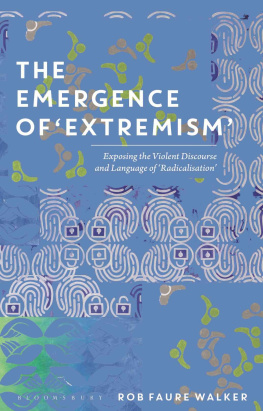The Ecology of Violent Extremism
About the Peace and Security in the 21st Century Series
Until recently, security was defined mostly in geopolitical terms with the assumption that it could only be achieved through at least the threat of military force. Today, however, people from as different backgrounds as planners in the Pentagon and veteran peace activists think in terms of human or global security, where no one is secure unless everyone is secure in all areas of their lives. This means that it is impossible nowadays to separate issues of war and peace, the environment, sustainability, identity, global health, and the like.
The books in this series aim to make sense of this changing world of peace and security by investigating security issues and peace efforts that involve cooperation at several levels. By looking at how security and peace interrelate at various stages of conflict, the series explores new ideas for a fast-changing world and seeks to redefine and rethink what peace and security mean in the first decades of the new century.
Multidisciplinary in approach and authorship, the books cover a variety of topics, focusing on the overarching theme that students, scholars, practitioners, and policy makers have to find new models and theories to account for, diagnose, and respond to the difficulties of a more complex world. Authors are established scholars and practitioners in their fields of expertise.
In addition, it is hoped that the series will contribute to bringing together authors and readers in concrete, applied projects, and thus help create, under the sponsorship of Alliance for Peacebuilding (AfP), a community of practice.
The series is sponsored by the AfP (http://www.allianceforpeacebuilding.org) and edited by Charles Hauss, government liaison.
The Ecology of Violent Extremism
Perspectives on Peacebuilding and Human Security
Edited by Lisa Schirch
Permission credit lines available at the back of the book.
Published by Rowman & Littlefield
A wholly owned subsidiary of The Rowman & Littlefield Publishing Group, Inc.
4501 Forbes Boulevard, Suite 200, Lanham, Maryland 20706
www.rowman.com
Unit A, Whitacre Mews, 2634 Stannary Street, London SE11 4AB
Copyright 2018 by Lisa Schirch
All rights reserved . No part of this book may be reproduced in any form or by any electronic or mechanical means, including information storage and retrieval systems, without written permission from the publisher, except by a reviewer who may quote passages in a review.
British Library Cataloguing in Publication Information Available
Library of Congress Cataloging-in-Publication Data
Names: Schirch, Lisa, editor.
Title: The ecology of violent extremism : perspectives on peacebuilding and human security / edited by Lisa Schirch.
Description: London ; New York : Rowman & Littlefield International, [2018] |
Series: Peace and security in the 21st century | Includes bibliographical references and index.
Identifiers: LCCN 2018021147 (print) | LCCN 2018023048 (ebook) | ISBN 9781786608475 (electronic) | ISBN 9781786608468 (cloth : alk. paper) | ISBN 9781786608451 (pbk. : alk. paper)
Subjects: LCSH: Terrorism. | Political violence. | Radicalism. | Human security. | Peace-building.
Classification: LCC HV6431 (ebook) | LCC HV6431 .E366 2018 (print) | DDC 363.325--dc23
LC record available at https://lccn.loc.gov/2018021147

The paper used in this publication meets the minimum requirements of American National Standard for Information SciencesPermanence of Paper for Printed Library Materials, ANSI/NISO Z39.481992.
Printed in the United States of America
Contents
Kevin Clements, Toda Peace Institute
Lisa Schirch, Toda Peace Institute, Alliance for Peacebuilding
Lisa Schirch
Lisa Schirch
Lisa Schirch
Scott Atran
Frances Flannery
Stone Conroy
Mari Fitzduff
Mark Hamilton
Rafia Bhulai
Lisa Schirch
Alistair Millar
Sverre Lodgaard
David Cortright
Lena Slachmuijlder
Kay Guinane
Teresa Dumasy and Sophie Haspeslagh
Elizabeth Hume and Laura Strawmyer
Humera Khan and Adnan Ansari
Arjun S. Sethi
Mohammed Abu-Nimer
Dean Piedmont and Gabrielle Belli
John Paul Lederach
I. William Zartman and Guy Olivier Faure
Lena Slachmuijlder
Lakshitha Saji Prelis, Michael Shipler, Rachel Walsh Taza, and Lena Slachmuijlder
Lena Slachmuijlder
Myriam Aziz and Lisa Schirch
Maria J. Stephan and Leanne Erdberg
Veronica Laveta
Millicent Otieno
Mossarat Qadeem
Agnes Chen, Paulus Hartono , and Agus Suyanto
Rebecca Wolfe and Keith Proctor
Matthew J. O. Scott
Aaron Chassy and Nell Bolton
Lisa Schirch
Foreword
The Toda Peace Institute is delighted that we have been able to nurture this book as it has evolved over the past two years. The Toda Peace Institute is an independent, nonpartisan institute committed to advancing a more just and peaceful world through policy-oriented peace research and practice. We commission evidence-based research; convene multitrack and multidisciplinary problem-solving workshops and seminars; and promote dialogue across ethnic, cultural, religious, and political divides. Our aim is to catalyze practical, policy-oriented conversations among theoretical experts, practitioners, policy makers, and civil society leaders in order to discern innovative and creative solutions to the major problems confronting the world in the twenty-first century.
We believe that this book does exactly that. It provides an extensive analysis of the sources of violent extremism; considers and critiques orthodox responses to such behavior; and maps out systematic, creative, and nonvio-lent alternatives. It needs to be read by policy makers, academics, and the general public because it provides a much-needed counterweight to all those who seek military solutions to what are complex, interconnected wicked problems.
This book developed out of a two-day conference organized by the Alliance for Peacebuilding, Eastern Mennonite UniversityThe Center for Justice and Peacebuilding, and the Toda Peace Institute in Harrisonburg, Virginia, during November 56, 2016. This meeting brought together leading theorists and practitioners, with extensive experience in the field of peace-building, negotiation, governance, democratic processes, intergroup dialogue, and the use of media to address key drivers of violent conflict. In order to break out of violent responses to extremism (which often seem to generate more violence and death), the authors in this book were asked to discuss an ecological or systems approach to violent extremism (VE). This is because ecological approaches to violent extremism pay much more attention to broader contextual and systemic issues than is common in most mainstream media and political analyses. Most orthodox counterterrorism strategies offer simplistic examinations of violent extremism by focusing solely on the individuals and groups using terror, without examining the broader factors driving or mitigating such behavior. The chapter authors document human security and peacebuilding approaches to violent extremism with vivid examples of how to address, for example, political conflicts, economic and social tensions, and trauma linked with humiliation.

 The paper used in this publication meets the minimum requirements of American National Standard for Information SciencesPermanence of Paper for Printed Library Materials, ANSI/NISO Z39.481992.
The paper used in this publication meets the minimum requirements of American National Standard for Information SciencesPermanence of Paper for Printed Library Materials, ANSI/NISO Z39.481992.

